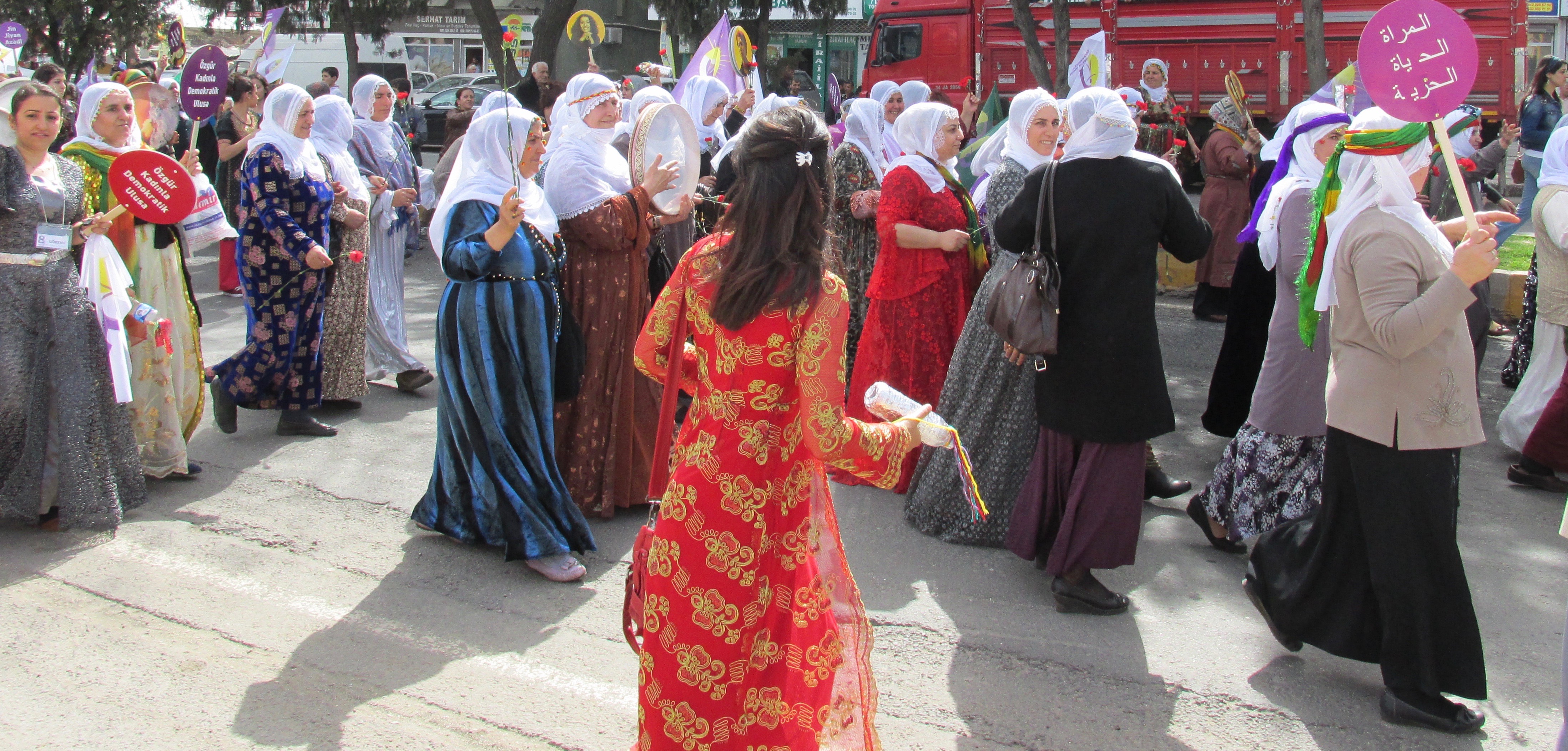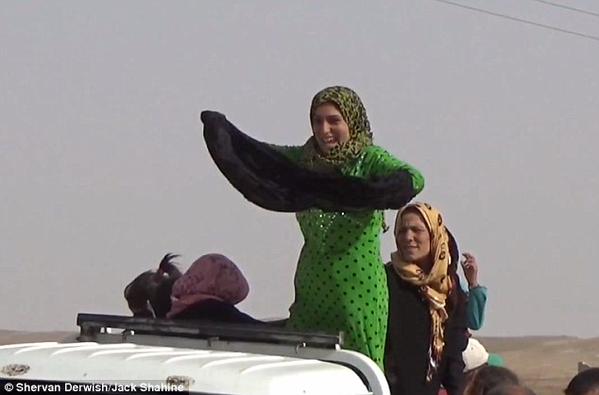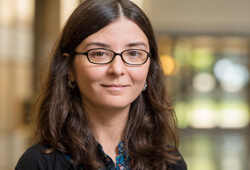
“The political and intellectual history of modernity,” writes historian Robert Orsi, “is also always a religious history.” However, as significant and diverse recent scholarship is now bringing to light, narratives around the political, intellectual, and religious history of modernity often serve not only to illuminate the past, but also to obscure it through the authorization of specific forms of experience and knowledge.
This symposium, entitled “Decolonizing Narratives, Denaturalizing Modernity,” aims to highlight recent scholarship that complicates received notions around the history of modernity. While focusing on distinct temporal, geographical, and religious contexts, in their shared attempts to uncover histories hidden by the dominant discourses of modernity, the authors featured in this symposium uniformly challenge the naturalization of modernity’s emergence and indicate that that the history of modernity has always been (and remains) fundamentally contested.
Modernity, Women, and War
How should we conceive of the relationship between modernist projects, women, and war in the Middle East? Studies of gender in the Middle East have argued that modernization processes have deeply shaped contemporary women’s identity formations and women’s movements (for a good discussion on the topic see Minoo Moallem 2005). Postcolonial feminist theorists like Moallem provide a wider critique of modernity as fundamentally linked to colonialism. My purpose here is to rethink the interrelated projects of modernity and colonialism through women’s struggles as I discuss how Kurdish women in the Middle East fight against the politics of war and violence. Their efforts suggest that new avenues for decolonization and modernity may be created wherein the role of women are radically re-imagined.
I believe that the main difficulty facing studies on women and gender in the Middle East revolves around developing a framework without relying on two premises: 1) the premise that the experiences of women from distinct national, ethnic, religious, and class backgrounds can be homogenized based on their identity as women; and 2) the premise that women’s status or oppression can be reduced to the centrality of Islamic and/or traditional forces (using, for example, dichotomies of “secular versus pious” or “modern versus traditional”). In addition, existing studies do not often take into account the co-constitutive relationship between recent wars in the region and modernity; how wars and modernity interact to affect women’s lives, as women take part in those wars in multiple positions; and how wars as contested sites of modernity and coloniality have transformed the gendered geopolitics of the region.
Let me briefly explain each of these two points. To begin with the first point, we know that feminist theorists with a postcolonial stance have long questioned the monolithic representation of women in the Middle East. According to this representation, women are often viewed as victims in some way—victims of “oppressive” Middle Eastern men; of colonialism; and/or of religious, traditional, and national powers. Feminist critiques effectively demonstrate that what we need to challenge is this homogenous and monolithic representation of women in the Middle East. This homogeneous perspective comes out of an approach that assumes Islam to be the key determining factor in women’s lives. This brings us to the second point, related to what Marnia Lazreg calls the “religious paradigm.” In this paradigm, which is dominant in the social sciences, women of “other” nations are perceived as yet-to-be-modern, for they are seen as trapped by religious/patriarchal dogmas and traditions. Postcolonial feminist debates challenging the centrality of Islam to existing analyses of modernity and women open up the ground for us to reconsider the interrelations among social, political, cultural, and religious forces that impact women’s lives, instead of explaining the status of women through Islam alone.
War and Colonialism
More importantly, another point I want to emphasize is the role of recent wars in the Middle East and how clearly they show the intersectional relationship between modernity and colonialism. This has been one of the main concerns of my own research on Kurdish women’s struggles for peace and democracy across borders. Wars in the Middle East cannot be understood if we merely base our analysis on the relationship between Islam and modernity. The link between modernity and coloniality is another paradigm to be considered when we discuss war-waging techniques in the Middle East. The perspective of Santiago Slabodsky becomes very useful here as he challenges Western modernity and its colonial foundations through a Jewish decolonial critique. Walter Mignolo, too, reminds us of the coupling of Western modernity and coloniality in President Bush’s statement referring to the U.S.’ wars in the region as “spreading democracy in the Middle East.” Democracy, progress, and peace are embedded into the rhetoric of modernity as much as a colonial logic is. Mignolo argues that this is indeed an extended endeavor to secure “the completion of the incomplete project of modernity” in the region (2007, 458). In this sense, any war waged in the name of “humanitarian” intervention is already part of a larger modernist and colonial enterprise. Particularly since 9/11, this nexus of modernity and coloniality has been a key site for the discourse of the War on Terror, the U.S. occupations of Afghanistan and Iraq, and the continuing war in Syria.
While the discourse of spreading democracy to the Middle East goes hand in hand with the discourse of “saving women” who are seen as victims of Islamic fundamentalist powers, I see current wars as creating an ambivalent terrain that allows for actions that are particularly destabilizing to existing discourses. This ambivalent terrain of war and violence makes it difficult to categorize women either as victims or as agents, insofar as it allows for various alternative, creative, and revolutionary modalities of political conduct for women. Even though war, modernity, and colonialism are intricately linked in the Middle East, I believe that the context of war is crucial to the formation of alternative women’s movements and groups as well as to the alternative imaginations of modernity, which I will illustrate through two examples from my research on Kurdish women.
Alternative Women’s Movements
The first example I want to draw on is the Peace Mothers organization. This is a group of Kurdish women who mobilized in reaction to the war between the Turkish state and the Kurdish guerrilla organization the PKK (Partiya Karkerên Kurdistan, or Kurdistan Workers’ Party). This war has been ongoing in Turkey since the late 1980s, alternating between temporary ceasefires or periods of peace and renewed outbreaks of violence. The Peace Mothers group is made up of the mothers of PKK guerrillas. They are visible members of protests in their characteristic white headscarves. These women pursue an end to the war across various national and international political platforms, whether in the streets or the Parliament. The Peace Mothers challenge and shift the boundaries of modern politics through their political participation as mothers. Furthermore, the figure of the Kurdish mother disrupts the image of the “modern woman” so long upheld by the hegemonic Turkish modernization project. The ideal Turkish woman citizen is represented as a mother and wife whose life “benefits” from the modernization project, circumscribed by the code of morality. In this project, mothers are responsible for raising patriotic, Turkish-speaking citizens. Kurdish mothers, however, often resist acting as breeders of Turkish national culture—for example, by speaking Kurdish and embracing Kurdish culture. In this context, the anti-war efforts of the Peace Mothers constitute a ground for claiming the right to be and to speak Kurdish. This stands in opposition to the supposed homogeneity of Turkey’s “modern” national community.

My other example is from just across the border from Turkey: the Kurdish women fighters in the Kurds’ resistance in Syria. At the time of the outbreak of war in Syria, we witnessed a proliferation of images of Kurdish women in the Western media. Cameras frame images of these Kurdish women smiling, carrying arms, casting off burqas, and smoking cigarettes. These women are portrayed as “modern,” “secular,” and “liberated”. In many of those photos, women cast off their burqas to show that they have been “freed” from IS upon entering Kurdish-controlled areas. These women, whether or not they carry arms, have become the “new” and “progressive” faces of the Middle East. Their fight against IS has been framed as a fight against “Islamic terrorism.” But outside of their supposed fight against “Islam,” the Western media has paid scant attention to the ideological side of these women’s struggle in Syria. In fact, Kurdish women define their fight as a women’s revolution, whose goal is the transformation of all segments of society, and the decolonization of their lands, their minds, their pasts, and their marginalized histories.
Even though the Peace Mothers in Turkey and Kurdish women in Syria continue to struggle, the international public has recently, it seems, lost interest in these Kurdish women. Why has this interest faded so quickly? I believe the answer to this question takes us back to the relationship between coloniality and modernity. Specifically, it returns us to the necessity of a postcolonial feminist perspective on such questions. Yet this interest and fascination with the struggles of Kurdish women is contingent on the Western eye. Indeed, the fetishizing, colonialist gaze is doomed to be short-term. The gaze of interest will inevitably find new objects of attention. To this fetishizing gaze, the acts of Peace Mothers and Kurdish women fighters might seem to juxtapose: one seeks peace and the other takes up arms. Yet both these groups struggle for the same ideal. Each works to build an alternate society by shattering the violent foundations of modernity. Each tries to create a non-colonial modernity and to reclaim modernity’s unfulfilled promise of peace and democracy. These women’s efforts for these goals lead us to ask: is it possible to imagine a modernity that is truly democratic and peaceful?
Further reading
Çağlayan, Handan. 2008. “Voices from the Periphery of the Periphery: Kurdish Women’s Political Participation in Turkey.” Presented at 17th Annual Conference on Feminist Economics, June 19-21, 2008 (Torino, Italy).
Kandiyoti, Deniz. 1987. “Emancipated but Unliberated? Reflections on the Turkish Case.” Feminist Studies 13(2): 317-338.
Lazreg, Marnia. 1990. “Gender and Politics in Algeria: Unraveling the Religious Paradigm.” Signs: Journal of Women and Culture in Society 15(4): 755-780.
Lewis, Reina. 2004. Rethinking Orientalism: Women, Travel and the Ottoman Harem. London, New York: I.B. Tauris.
———. 1996. Gendering Orientalism: Race, Femininity and Representation. London and New York: Routledge.
Mahmood, Saba. 2005. Politics of Piety: The Islamic Revival and the Feminist Subject. Princeton: Princeton University Press.
Mignolo, Walter. 2011. The Darker Side of Western Modernity: Global Futures, Decolonial Options. Durham and London: Duke University Press.
———. 2007. “Delinking: The Rhetoric of Modernity, the Logic of Coloniality and the Grammar of De-Coloniality.” Cultural Studies 21(2-3): 449-514.
Moallem, Minoo. 2005. Between Warrior Brother and Veiled Sister: Islamic Fundamentalism and the Politics of Patriarchy in Iran. Berkeley, Los Angeles and London: University of California Press.
Moghadam, M. Valentine. 1999. “Revolution, Religion, and Gender Politics: Iran and Afghanistan Compared.” Journal of Women’s History 10(4): 172-195.
———. 2003 [1993]. Modernizing Women: Gender and Social Change in the Middle East. Boulder: Lynne Rienner Publishers.
Üstündağ, Z. Nazan. 2005. Belonging to the Modern: Women’s Suffering and Subjectivities in Urban Turkey. Doctoral dissertation, Indiana University.

